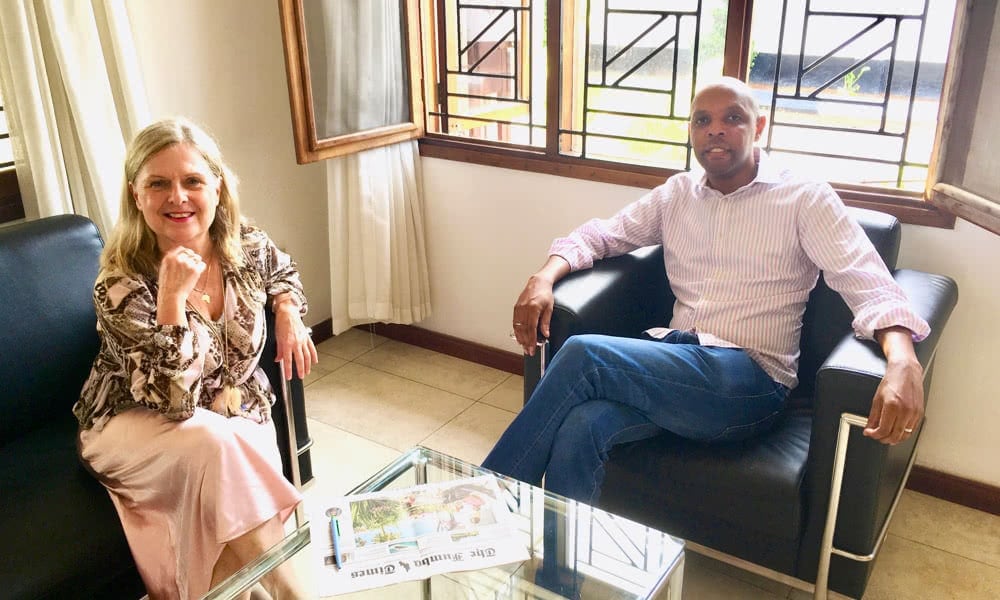
Megacities, a huge demand for living space coupled with a shocking lack of urban planning: How will living and housing unfold in the years to come in Zanzibar, Tanzania and Africa as a whole? FUMBA TIMES speaks exclusively to banking and real estate expert Heri Bomani in Dar es Salaam.
With my wife and three children in a three bedroom family home in Masaki which we built about 15 years ago.
I find it hard to believe that Dar es Salaam can grow to become a megacity of such scale. It would just be too chaotic. Historically Dar has been considered a haven of opportunity, but such a population growth cannot be sustained even by a much improved infrastructure. Tanzania has a long coastline, vast natural resources, and rich arable land; new economic zones will emerge that will create various centres of gravity. Dodoma is already an example, Arusha with its mild climate is on the rise.On account of oil and gas finds regions such as Mtwara and Lindi will also come to the fore.
I am pleasantly surprised by the progress of Zanzibar. Tourism numbers have doubled in the last five years and will easily double again to one million visitors per year. Together with oil and gas discoveries this brings a lot of economic opportunities, leaving Zanzibar on a strong footing for rapid economic growth. That’s why building projects such as the eco-city of Fumba Town are viable – and utterly needed, especially as they open up a part of the island which has seen limited investments despite close proximity to Stone Town in the past.
The island is East Africa’s only natural getaway destination with a rich and unrivalled heritage not found in other islands along the eastern seaboard of the continent. An ideal place for holiday home investments by East Africans who live only few hours of flight away.
Statistically, with an average per capita income of $1,090 in Tanzania, very few people. That’s why most people in Dar es Salaam rent, or build from cash flow over many years.
Very much so. There is too little and inadequate supply of housing. Buildings often have poor quality, are wrongly located, and priced at a level that consumers can’t afford. Most developers in Africa do not build efficiently or with scale to bring costs down. A bedroom of 9sqm is normal in Europe. Consumers in Tanzania are supplied with homes on average 50-80 per cent bigger than required for comfortable living.
That’s why we consider Fumba one of the most well-structured building projects in the country.
A decent quality house can be built between $400-600 per sqm. But retail prices in Tanzania now average double of that. The challenge are developments of scale, a developer building 1,000 homes in one location complete with a decent infrastructure. The buildings should not be too high, we are not in Shanghai. Tanzanian buyers prefer to live privately within their own boundary and with space for amenities.
$20,000 - $50,000 for a flat or house with up to 3 bedrooms. But we need many more 1- and 2-bedroom units.
Many people may feel uncomfortable with current economic strategies in Tanzania. However, the government’s approach has stabilised the market towards reality, for instance in land prices, removing a lot of speculative elements. What we need is a bolt of confidence.
I would say more a reality rather than a myth. It is growing, and consumers are becoming more sophisticated.
It’s an entirely different market. Here, in Africa, I would consider an interest rate of 10 per cent or lower as affordable; current rates in local currency are however averaging nearer 20 per cent.If developers are able to offer units at half of the current costs and banks cut borrowing rates by half housing will become 100 per cent cheaper. Another way to go would be policy interventions on VAT for homes, infrastructure rebates from taxes, or infrastructure contribution by the State,
Many. People are still allowed to build in flood-prone areas. Waste management is poor with significant amounts of waste dumped into the ocean without treatment.
More infrastructure! And actually, infrastructure and compliance are hallmarks of the current government.
The Dar rapid bus system (BRT) is the first to be rolled out in East Africa. You can see a bus stop just outside the ferry port when coming from Zanzibar. The first phase of BRT covers 25 kilometres from Kimara to the Central Business District, transporting 400,000 people daily. Traffic has been significantly reduced and residential developments are springing up along the corridor.
My vision for urban living of the future is to decentralise health, education, commercial and retail activity into satellite centres, and actively discourage the historical pattern of the majority of business happening in the central business district. State support for infrastructure will stimulate the private sector. Both coming together, can turn Dar into a much more pleasant city to work, live and play.
Heri Bomani, 48, has worked 15 years in banking, as Managing Director of the Tanzanian arm of Kenya Commercial Bank (KCB), and Retail Director at Standard Chartered Bank. He now operates a financial services and real estate focused group under the brand Pangani Group.